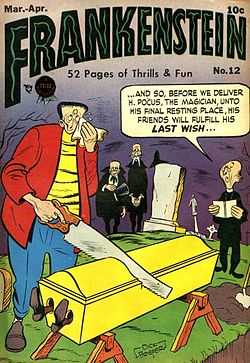Frankenstein (Prize Comics)
| Frankenstein | |
|---|---|
 The monster, from Prize Comics' Frankenstein #12 (April 1948). Art by Dick Briefer. | |
| Publication information | |
| Publisher | Crestwood Publications |
| First appearance | Prize Comics #7 (Dec. 1940) |
| Created by | Dick Briefer |
There have been many comic book adaptations of the Frankenstein monster story created by Mary Shelley in her 1818 novel Frankenstein. Writer-artist Dick Briefer presented two loose adaptations of the story in the Prize Comics series Prize Comics and Frankenstein from 1940 to 1954. The first version represents what comics historians call American comic books' first ongoing horror feature.
Publication history
Comics' first horror feature
In Prize Comics #7 (cover-dated Dec. 1940), writer-artist Dick Briefer (using the pseudonym "Frank N. Stein" in the latter role) introduced the eight-page feature "New Adventures of Frankenstein", an updated version of 19th-century novelist Mary Shelley's much-adapted Frankenstein monster.[1] Considered by comics historians including Don Markstein as "America's first ongoing comic book series to fall squarely within the horror genre",[2][3] the feature, set in New York City circa 1930, starred a guttural, rampaging creature actually dubbed "Frankenstein" (unlike Shelley's nameless original monster).
In Prize Comics #11 (June 1941), Briefer dropped the "Frank N. Stein" pen name of the previous three stories and introduced Denny "Bulldog" Dunsan as Frankenstein's ongoing antagonist. Prize Comics #24 (Oct. 1942) pitted the monster against Bulldog and publisher Prize Comics' superheroes the Black Owl, the Green Lama, and Dr. Frost; the non-superpowered teens Yank and Doodle ("America's Fighting Twins"); and the namesake characters from the humor feature "General and the Corporal".[4] As with many comics characters of the time, the monster found himself in the European theater of World War II fighting Nazis.
Humor feature
Briefer's better-known version of the Frankenstein monster, however, developed upon the monster's return from the war, in Frankenstein #1 (undated, 1945),[5] appearing roughly concurrently with the eight-page story "Enter Frances Stein" in Prize Comics # 53 (June 1945),[6] which followed "possibly the last 'first version' story of Frankenstein" in Prize Comics # 52 (April 1945)[7]
Like many returning veterans, Frankenstein settled into small-town life, becoming a genial neighbor who "began having delightful adventures with Dracula, the Wolfman and other horrific creatures. The only two times he was featured on the Prize Comics cover (both in 1947), he was referred to as 'The Merry Monster'".[2] Briefer, with his trademark "loose and smooth ink and brush skills" began telling stories that would "straddle some amorphous line between pure children's humor and adventure and an adult sensibility about the world".[8]
Author Dan Nadel, who included Briefer in his book Art Out of Time: Unknown Comics Visionaries 1900-1969 (Harry N. Abrams, 2006, ISBN 0-8109-5838-4, ISBN 978-0-8109-5838-8), described Briefer as
...one of the few guys in the 1940s who had that loose, gestural art style that's funny. The drawing is inherently funny. Which is really unusual for humor comics of the time ... [in that] it's tight drawing. It's self-contained and beautiful. But Briefer is all over the place. When he does these swooping pratfalls that Frankenstein takes, the lines actually reflect the gag. It's nice. [...] And they're funny as comics. They read well and are beautifully drawn; they're full of unforgettable images, like the wizard eating Frankenstein on a hot dog. You'll never forget it, for better or for worse.[9]
Briefer's humorous Frankenstein ran through Prize Comics #68 (March 1948), and his humorous Frankenstein ran through issue #17 (Feb. 1949). Three years later, Briefer (1915–1980) revived the series with his original, horrific Frankenstein from #18-33 (March 1952 - Nov. 1954).
Following the cancellation of Frankenstein during an era that put much pressure on horror comics and other violent comic books, leading to the creation of the Comics Code,[10] Briefer left the comic industry for commercial advertising art.[11]
Reprint collections
- Briefer, Dick. The Monster of Frankenstein (Idea Men Productions, 2006) ISBN 1-4196-4017-8, ISBN 978-1-4196-4017-9
- Briefer, Dick. Dick Briefer's Frankenstein (Library of Horror Comics' Masters, IDW/Yoe Books, 2010) ISBN 1-60010-722-2
See also
Footnotes
- ↑ Prize Comics #7 (Dec. 1940) at the Grand Comics Database
- ↑ 2.0 2.1 Frankenstein (1940) at Don Markstein's Toonopedia. Archived from the original November 7, 2011.
- ↑ Watt-Evans, Lawrence. "The Other Guys", The Scream Factory #19 (Summer 1997), reprinted as "The Other Guys: A Gargoyle's-Eye View of the Non-EC Horro Comics of the 1950s" at Alter Ego #97, October 2010, pp. 3-33. On page 5 of the latter, the author notes, "...there were no horror comics as such in the earliest days. The first real horror series seems to have been the 'Frankenstein' series by Dick Briefer, in Prize Comics ... [which was] a superhero title, featuring the Black Owl, the Green Lama, and the like, except for this one aberration".
- ↑ Prize Comics #24 (Oct. 1942) at the Grand Comics Database
- ↑ Frankenstein Comics at the Grand Comics Database. (Note: Series title per its postal indicia and all covers except that of #1 is simply Frankenstein)
- ↑ Prize Comics #53 (June 1945) at the Grand Comics Database
- ↑ Indexers Lou Mougin/Tony R. Rose, Prize Comics # 52 (April 1945) at the Grand Comics Database
- ↑ Weems, Erik (2004). "Dick Briefer". Art & Artifice / EEWeems.com. Archived from the original on February 19, 2010.
- ↑ "Preview: Art Out Of Time, Dan Nadel". TheComicsReporter.com. May 20, 2006. Archived from the original on February 19, 2010.
- ↑ Hajdu, David. The Ten-Cent Plague: The Great Comic-Book Scare and How It Changed America (Farrar, Straus and Giroux, 2008) ISBN 0-374-18767-3, ISBN 978-0-374-18767-5
- ↑ Dick Briefer at the Lambiek Comiclopedia. Source erroneously lists death date as 1982.
External links
- Frankenstein #32 (vol. 5, #4 per indicia): "The Battle of the Monsters" and "The Beautiful Dead" (reprinted stories)
- "Dick Briefer's Frankenstein". (fan site). Archived from the original on April 30, 2011.